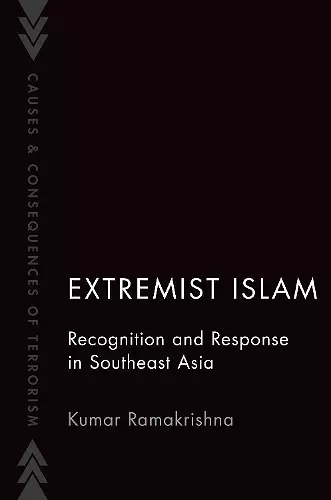Extremist Islam
Recognition and Response in Southeast Asia
Format:Paperback
Publisher:Oxford University Press Inc
Published:4th Jul '22
Should be back in stock very soon
This paperback is available in another edition too:
- Hardback£76.00(9780197610961)

Since the Bali terrorist attacks in 2002, law enforcement agencies have rigorously combatted terrorist networks in Southeast Asia, yet groups motivated by violent extremist interpretations of Islam remain resilient and dangerous. This book shines a light on specific beliefs, behaviors, and policies that impact these challenges, ultimately offering cutting-edge, effective tools for response. The book begins by challenging misguided and controversial notions that depict Islam as an inherently violent religion, arguing that the theological-ideological amalgam of what has been called Salafabism is the more useful lens for recognizing closed-minded extremist currents. The book carefully distinguishes this Salafabist extremist mindset from relatively open-minded Salafabist radicalism, paying due attention to "nonviolent extremists" and the ways they can contribute to rather than reduce violent terrorist activity in the region. Using poignant case studies from Malaysia, Singapore, the Philippines and Indonesia, the book clarifies a bewildering range of terminology associated with Islamist violence and explains how imprecise and oversimplified narratives are destructive to progress--and worse, empowering to terrorist organizations. These chapters build up to research-informed policies and rhetorical recommendations for improved outcomes. With its novel insights into the root causes of extremist terrorism in Southeast Asia, the ineffective policies that prohibit progress and promote unrest in this region, and the avenues for positive change, this book offers a comprehensive strategy for fostering theologically sound yet culturally authentic counterterrorist measures that defend the complex, richly textured tapestry of culture in Southeast Asia.
It has often been claimed that 'Terrorism has no Religion,' Yet major terrorist organizations claim to be acting in the name of true religion and manage to radicalize thousands of young men and women. Kumar Ramakrishna takes a hard look at the ambivalent relationship between religion and violence--an honest and persuasive analysis. * Alex P. Schmid, Editor-in-Chief, Perspectives on Terrorism *
In a sweeping, rigorous, interdisciplinary volume that draws from extensive writings of, and interviews with, extremists, Kumar Ramakrishna asks us to take the religious extremist mindset seriously, and shows that both violent and non-violent Islamist extremism in Southeast Asia draw from the same theological DNA. Through detailed looks into the lives of extremists in Indonesia, Singapore, Malaysia, and the Philippines, Ramakrishna shows how they were immersed in an extremist ecosystem that drives their outlook, and makes a major contribution to our understanding of extremism in Southeast Asia. * Justin V. Hastings, Professor of International Relations and Comparative Politics, University of Sydney *
This book provides a very comprehensive and cogent analysis of religious extremism, with a focus on disruptive challenges by Salafist groups and regional states' responses to them in Southeast Asia. Its diagnoses of the issues by a very seasoned scholar in the field is highly illuminating and penetrating. The book deserves to be read and its findings applied very widely. * Amin Saikal, Adjunct Professor of Social Sciences, University of Western Australia *
ISBN: 9780197610978
Dimensions: 157mm x 236mm x 29mm
Weight: 612g
432 pages